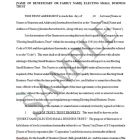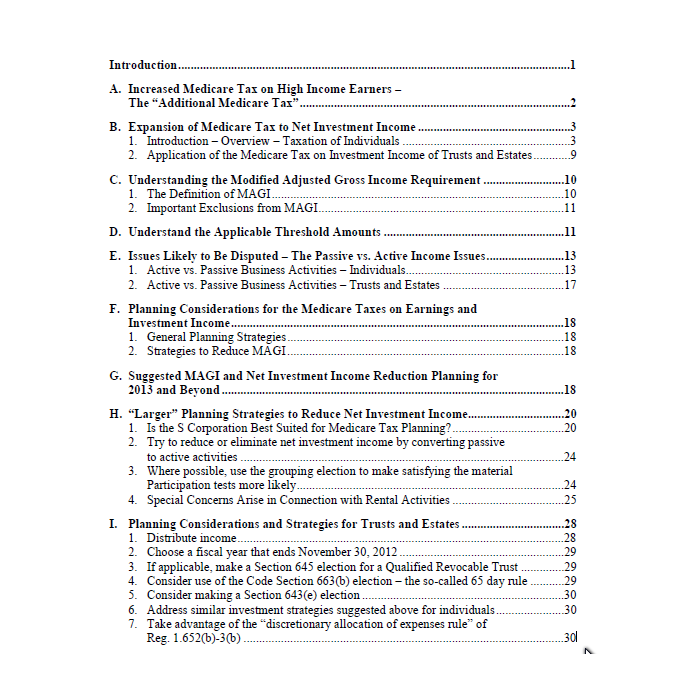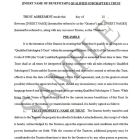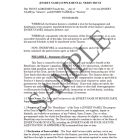Planning For The New Medicare Taxes (30-Page Book)
Released February 25, 2013 - Written by Steven G. Siegel.
Click the above "Learn More" button to read the Table of Contents, several Sample Pages and Mr. Siegel's curriculum vitae.
See sample pages above for the complete Table Of Contents. Alternatively, here are the main topics covered in this book:
Introduction
A. Increased Medicare Tax on High Income Earners - The "Additional Medicare Tax"
B. Expansion of Medicare Tax to Net Investment Income
1. Introduction - Overview - Taxation of Individuals
2. Application of the Medicare Tax on Investment Income of Trusts and Estates
C. Understanding the Modified Adjusted Gross Income Requirement
1. The Definition of MAGI
2. Important Exclusions from MAGI
D. Understand the Applicable Threshold Amounts
E. Issues Likely to Be Disputed - The Passive vs. Active Income Issues
1. Active vs. Passive Business Activities - Individuals
2. Active vs. Passive Business Activities - Trusts and Estates
F. Planning Considerations for the Medicare Taxes on Earnings and Investment Income
1. General Planning Strategies
2. Strategies to Reduce MAGI
G. Suggested MAGI and Net Investment Income Reduction Planning for 2013 and Beyond
H. "Larger" Planning Strategies to Reduce Net Investment Income
1. Is the S Corporation Best Suited for Medicare Tax Planning?
2. Try to reduce or eliminate net investment income by converting passive to active activities
3. Where possible, use the grouping election to make satisfying the material Participation tests more likely
4. Special Concerns Arise in Connection with Rental Activities
I. Planning Considerations and Strategies for Trusts and Estates
1. Distribute income
2. Choose a fiscal year that ends November 30, 2012
3. If applicable, make a Section 645 election for a Qualified Revocable Trust
4. Consider use of the Code Section 663(b) election - the so-called 65 day rule
5. Consider making a Section 643(e) election
6. Address similar investment strategies suggested above for individuals
7. Take advantage of the "discretionary allocation of expenses rule" of Reg. 1.652(b)-3(b)
Related Form(s): links to related Forms on this site appear immediately after the below "Author" curriculum vitae.
Related CLE Course: to listen to, and obtain CLE/MCLE credits in those states for which it is listed, please visit our sister site, www.nlfonline.com, click on your state and scroll to this title under the "Estate Planning & Taxation" heading: "Planning For The New Medicare Taxes".
Author:
Steven G. Siegel is president of The Siegel Group, which provides consulting services to attorneys, accountants, business owners, family offices and financial planners. Based in Morristown, New Jersey, the Group provides services throughout the United States. Mr. Siegel is the author of many books, including: The Grantor Trust Answer Book (2012 and 2013 CCH); CPA’s Guide to Financial and Estate Planning (AICPA 2012); and Federal Fiduciary Income Taxation (Foxmoor 2012). In conjunction with numerous tax planning lectures he has delivered for the National Law Foundation, Mr. Siegel has prepared extensive lecture materials on the following subjects: Planning for An Aging Population; Business Entities: Start to Finish; Preparing the Audit-Proof Federal Estate Tax Return; Business Acquisitions: Representing Buyers and Sellers in the Sale of a Business; Dynasty Trusts; Planning with Intentionally-Defective Grantor Trusts, Introduction to Estate Planning; Intermediate-Sized Estate Planning; Social Security, Medicare and Medicaid: Explanation and Planning Strategies; Subchapter S Corporations: Using Trusts as Shareholders; Divorce and Separation: Important Tax Planning Issues; The Portability Election; Generation-Skipping Transfer Tax: A Comprehensive Review; and many other titles. Mr. Siegel has delivered hundreds of lectures to thousands of attendees in live venues and via webinars throughout the United States on tax, business and estate planning topics on behalf of numerous organizations, including The Heckerling Institute on Tax Planning, CCH, National Law Foundation, AICPA, Western CPE, the National Society of Accountants, the National Tax Institute, Cohn-Reznick, Professional Education Systems, Inc., Foxmoor Education, many State Accounting Societies and Estate Planning Councils as well as on behalf of private companies. He is presently serving as an adjunct professor of law in the Graduate Tax Program (LLM) of the University of Alabama, and has served as an adjunct professor of law at Seton Hall and Rutgers University law schools. Mr. Siegel holds a bachelor’s degree from Georgetown University (magna cum laude, phi beta kappa), a juris doctor from Harvard Law School and an LLM in taxation from New York University Law School.
-
 Electing Small Business Trust (13 Pages)Special Price $59.00 Regular Price $69.00
Electing Small Business Trust (13 Pages)Special Price $59.00 Regular Price $69.00



